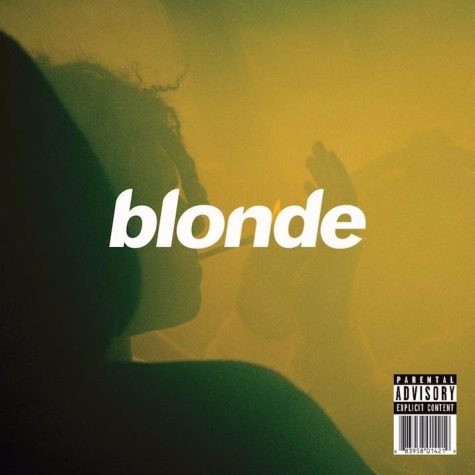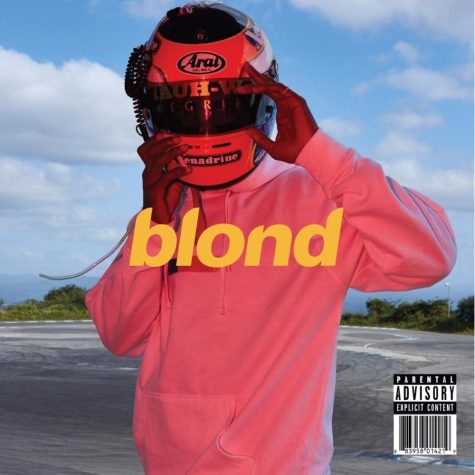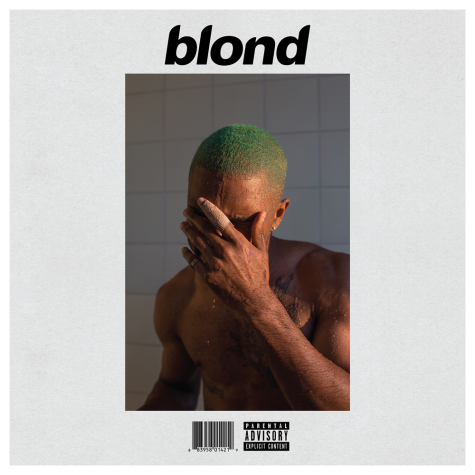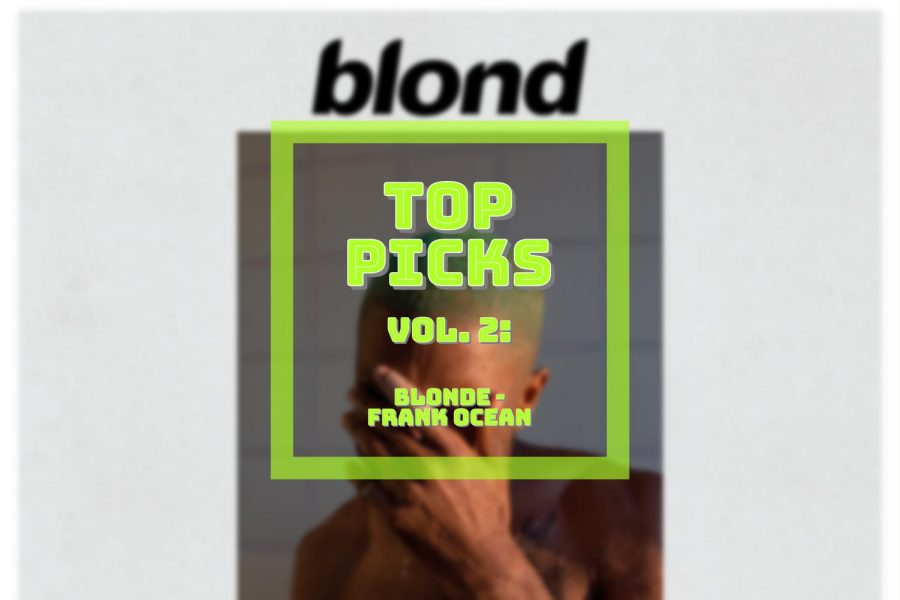On August 20, 2016, Frank Ocean released his second studio album, Blonde. At first glance, the record is simply a collection of really good music. However, upon further inspection, Ocean’s conceptual ambition comes to fruition; Blonde is the personal embodiment of duality, a nuance that Ocean devoutly cherishes both inside and outside his music.
Blonde opens and unfolds into the opening track, “Nikes,” as a current of dreamy synths washes over and swirls around a set of lazily tapped drums. Ocean pierces through the instrumental with unrecognizably altered vocals, pitched up and reverberated. As Ocean glides through the track, he delivers messages of materialism, drug use and injustice. Despite the broad range of topics brought up on “Nikes,” most notably is the recurring premise of duality. Halfway through the track, Ocean’s voice is stripped of any superficial effects as the instrumental transforms with an elegant plucking of strings; lyrics of vulnerability and crumbling facades spoken through a false confidence bring the track to a close, masterfully setting up what is to come.
Track two, “Ivy,” delivers a warm and nostalgic tale of young love, Ocean adopts a youthful glint into his voice as an airy and beautiful electric guitar swims around him. Despite the young relationship being described as doomed from the start, Ocean still recalls the moments with a strange fondness, reminiscing the pair’s pure and innocent dive into love for the first time.
Ocean continues to look in on past memories on “Pink+White”; a cheerful piano loop accompanies a bouncing bass guitar to form a strangely upbeat melody that quickly juxtaposes the sorrowful memoir found within the lyrics. Ocean paints the remnants of a distant memory, one where the bleeding colors of sunset— pink and white— illuminate a heartfelt conversation with a dearly departed friend.
A burst of church organs inaugurates track five, “Solo,” as Ocean instantly indulges in an ironic commentary detailing an impetuous hallucinogen trip, highlighting a drifting state of loneliness and suffering as he battles between religion and medication—an inner conflict explored within the chorus, as images of heaven and hell mirror those of intoxication and being sober. The name of the song serves as a double entendre, as Ocean expresses feeling “solo” or alone, and “so low,” desperately needing to get higher.
What begins as a playful exercise in reminiscing on “Self Control” turns into a painful recalling of lost love and enduring lust. Ocean navigates through an elegant ensemble of subdued guitar balladry and morphing vocal soundscapes as pastel voices beg for an enduring place within a former lover’s heart. Despite yearning to be embraced once more, Ocean acknowledges that the past relationship can not be revisited further than physical intimacy, and instead pleads for one more night of companionship as the instrumental slowly dissolves to nothingness.

At the heart of Blonde’s intricately woven theme, perfectly equidistant from the first and last tracks, lies its quintessential track and conceptual ribbon, “Nights.” Grating guitar riffs and persistently punched snare create the album’s loudest and most crowded instrumental yet, Ocean rapping about the aggravations of his life and relationships, describing both violence and drug use as ways to work through some of the most difficult nights—the narrative of the track transpiring during the events of Hurricane Katrina, a time when Ocean was displaced and homeless. Halfway through, a storm of tangled riffs and clamorous siren-like synths usher panic into the instrumental as the track swells to a dangerous crescendo, the inevitable thunderous crash of noise abruptly cut off by an enveloping inverted bass kick, drastically transforming the soundscape of “Nights” at the exact—to the second—midpoint of the album. The aftermath of the sonic collision is a calm, starry field of glimmering snares and dreamy, elongated keys, a pitched-up Ocean gliding over the musical currents in a manner that can only be interpreted as the antithetical response to the first half of the track. Cloudy utterances of nostalgia find Ocean thinking back to his life in New Orleans before Katrina hit, subdued and relaxed with his vocals entrenched in mellow aftereffects. He relates the financial difficulties of his family during this time to his homelessness after the storm, never raising an octave in irritation while reliving the moments that had previously sparked extensive frustration in the first half of the song. The duality of “Nights’” two halves summarize Ocean’s greater theme throughout, as his voice fades and the second half of the album begins.
As the epic of “Nights” crumples away, an unfamiliar voice takes precedence; legendary MC, Andre 3000 of Outkast, is left on his own for track 10, “Solo(Reprise).” A quick and unrelenting rapping performance from Andre showcases the remarkable prowess of interwoven rhythm and wordplay he possesses, tumbling forward without breath as a resonant grand piano stands alone in the instrumental. Andre’s stay is brief and potent, reprising the themes previously touched on in “Solo,” and departing before the song can reach 90 seconds.
A gentle breeze of synth fills the air of “White Ferrari,” Ocean gingerly fluttering over the surface. The winds of instrumental carry Ocean on a delicate soar over a deeply personal memory, one that carries a profound emotional and existential weight in his mind even after all the years; the memory of his first love, so vivid that the embers of a subtle car ride still ignite into vibrant imagery within Ocean’s mind, unwavering from time. Imperfectly strummed guitar chords charmingly solidify into the instrumental as Ocean’s voice multiplies into a weightless choir; the poetic wisdom imparted upon Ocean from his youth echo into the clouds: “mind over matter is magic”—an ideology about rejecting materialism, reaching back to the themes of “Nikes”. The Instrumental begins to slowly fall away into a single warm guitar, simple chords strummed slowly and deliberately. In the emptiness, Ocean reintroduces himself from above the clouds, his voice an angelic whisper—all-encompassing and resonant yet incorporeal enough to float away into billowing whips with a gentle touch. The freedom of existential thought fulfills Ocean’s yearning for creativity and nuance as he departs from the song, drifting into his next song.

A lonesome and sonorous electric guitar floods the atmosphere as faltering and off-cadence singing recounts the features of a past lover; “Seigfried” remains unique within Blonde, both because of its numbing melancholy and because of its ambiguity. The track is largely an autobiographical account of Ocean’s struggles with his sexuality, facing pressures from both the outside world and internally that threaten to compromise him. Internal conflict with mortality, drug dependence, individuality and most notably, his love for a man whom he cannot name, speckle the unstructured ballad, creating what is possibly Ocean’s most personal and tragic song to date. The echoed outro accounts an agonizing battle between closeted love and public image; “I’d do anything for you (In the Dark).”
“Godspeed” shines through the mist, as if the light at the end of the tunnel, Ocean triumphantly belting farewell to a former lover, however, this time with acceptance and thoughtfulness. The song is short and powerful, with grand piano keys and organs swollen and conquering. Before departing, Ocean is sure to remind his former love that he will always hold them in his heart and wishes them the best.
The final track on Blonde, track 17 “Futura Free”, sees Ocean looking back upon his struggles, fame and success. High-pitched and quickened ramblings falter over a simple piano loop, yet the mood is jubilant, Ocean dedicating lines to his mother, his friends, and his idols. Familiarly, “Futura Free” is divided into two halves, the latter completely abandoning any instrumental or song, and instead shifting its focus entirely.
The closing minutes of “Futura Free” features an interview between Ocean and his friends, detailing hopes, dreams, successes, failures and the question of what is to come. Looking back on life is something Ocean does often on Blonde, pondering distant memories and past loves. Ocean uses these moments of remembrance as a vehicle to look forward, hoping to figure out what is to come based upon what has been, leaving the listener with one last rhetorical; “how far is a light-year?”
 Rating: 10/10
Rating: 10/10
Best Song: Seigfried





















